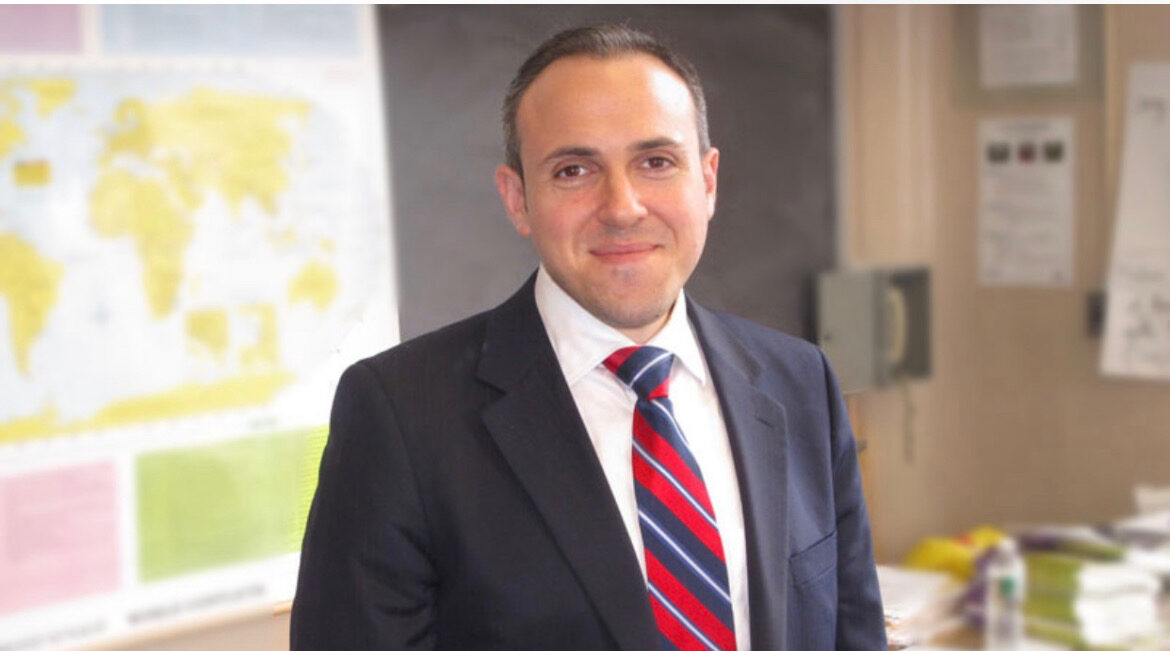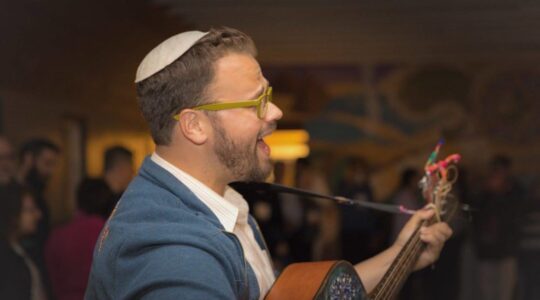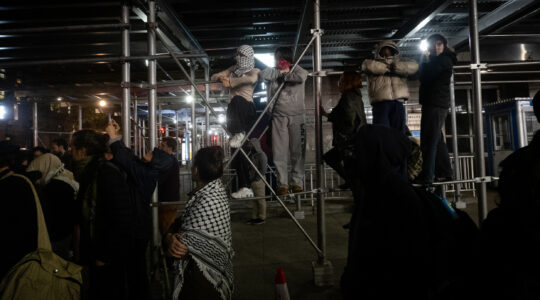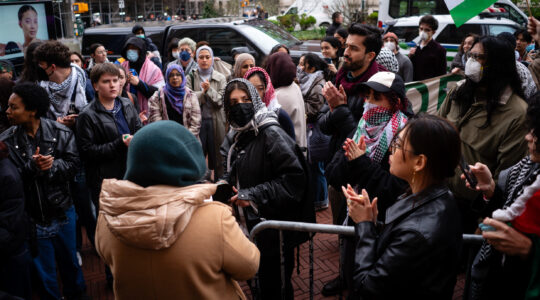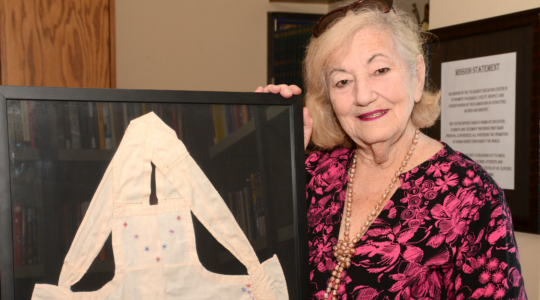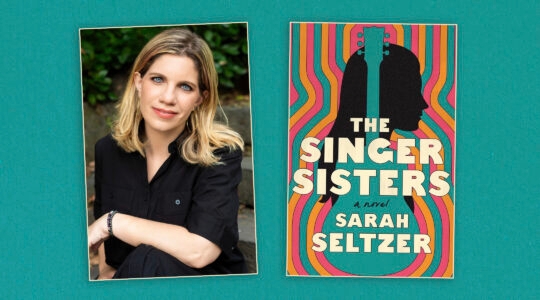(New York Jewish Week) – When Mark Treyger entered City Council a decade ago, it was in the shadow of a crisis: A little more than a year earlier, Superstorm Sandy had ravaged his South Brooklyn district, flooding buildings and cars and shuttering a local hospital for months.
To help his constituents with their ongoing recovery, Treyger connected between diverse Jewish groups — such as Sephardic congregations that donated clothing, furniture and other supplies to South Brooklyn’s Chabad community. The Met Council, a Jewish social services organization, provided food to Russian-speaking Jews in the area, as well as to other groups including Black and Hispanic residents. Treyger was later named chair of the council committee tasked with recovery from the storm.
Now, as he enters a new role as CEO of the city’s Jewish Community Relations Council, Treyger is again face-to-face with a crisis — the Israel-Hamas war that began on Oct. 7 and the corresponding rise in antisemitism. The uptick in hate has posed a particular challenge to the organization’s core mission: to be a liaison between the city’s diverse Jews and its vast ethnic and religious tapestry — some of whose leaders have called for a ceasefire in Gaza.
Treyger hopes the same strategy that served him after Sandy — of drawing different groups together toward a common purpose — can provide an effective response this time, too. And as a former high school teacher, he plans to focus his fight against antisemitism on education.
“I have seen the strength and beauty of the community when we’re working together addressing the most pressing needs and right now, in this moment, post-Oct. 7, with hate crimes on the rise, antisemitism on the rise, we have no time to waste,” Treyger told the New York Jewish Week in a phone interview. “I am under no illusion of how serious the challenges are, particularly in this post-Oct. 7 world.”
The grandson of Holocaust survivors and World War II veterans, Treyger was born in Brooklyn to a family that had immigrated to New York from what is now Ukraine and grew up in the Brooklyn neighborhood of Bensonhurst. He attended Edward R. Murrow High School in Midwood and spent eight years as a social studies teacher in Brooklyn before running for public office.
During his seven-year tenure representing Brooklyn’s 47th District, Treyger focused on Sandy relief efforts and headed the council’s committee on education, through which he pushed for remote learning data during the pandemic. In 2022, after his two terms on the council were up, Mayor Eric Adams appointed Treyger as the director of intergovernmental affairs for the city’s public schools in 2022.
At JCRC-NY, Treyger, who begins the job in March, will focus on strengthening ties among New York City’s Jews, and between Jews and other groups. The JCRC, which had more than $10 million in revenue in 2021 and a staff of 30, has 60 Jewish member organizations — from the New York offices of national organizations to neighborhood social services groups — and says more than 500 faith and ethnic groups work with the organization. Its flagship event is the annual Celebrate Israel Parade which it says draws 40,000 people.
As a veteran educator, it’s no surprise that Treyger focuses on the city’s schools when he thinks about rising antisemitism. He isn’t alone: Teachers and students have reported antisemitic harassment in recent years, and an antisemitic riot in November against a Jewish teacher at Hillcrest High School in Queens drew national attention.
An anti-Israel student walkout in November saw teens shouting antisemitic epithets. There has also been swastika graffiti in schools, some of it predating the Oct. 7 attack.
A rally against antisemitism in schools earlier this month on the steps of the school department’s headquarters in downtown Manhattan drew around 200 people, including students and teachers. They demanded action from Chancellor David Banks, who outlined a plan for combating hatred last month after engaging with the Jewish community and other stakeholders.
Treyger and the JCRC have worked with Banks to confront antisemitism in schools, a problem both men say demands both short- and long-term solutions.
Support the New York Jewish Week
Our nonprofit newsroom depends on readers like you. Make a donation now to support independent Jewish journalism in New York.
“We are going to double down on education. We must. This is a crisis-level emergency,” Treyger said. “This is not a situation where we can afford to fail. This can quickly spiral into a generational crisis if we do not get a hold of this issue right now.”
In line with Banks’ plan, Treyger said in the short term, the school system needs to make sure incidents of hate are reported, documented and disciplined.
In the long term, Treyger plans to help provide training and resources about Israel to teachers, many of whom lack expertise on the topic and fear blowback from students and parents. Teachers have told the New York Jewish Week and Department of Education officials that they avoid the issue, leaving students to form their opinions based on unreliable sources such as social media.
After the riot at Hillcrest, students told Banks they had learned about the conflict online. “We cannot leave it to social media to educate our children,” Banks said at a press conference last month.
Treyger’s effort will extend to higher education. He said the JCRC was monitoring how colleges and high schools are enforcing Title VI protections for Jewish students, which guarantee them recourse from discrimination. The JCRC has a formal partnership with the City University of New York (CUNY) system, which has pledged to crack down on antisemitism amid pressure from federal and state authorities.
“Safety is non-negotiable, that is the foundation that’s required to have quality-rate education, and these cases are piling up,” Treyger said.
In addition to his focus on education, Treyger said he will make coalition building a priority, both within the Jewish community and with non-Jewish groups.
“An attack against one member of our community is an attack against everyone and I take that very seriously,” he said.
He pointed to his ties with Susan Zhuang, New York City’s first Chinese-American council member. Her District 43 includes parts of Brooklyn such as Boro Park, which has a significant Jewish population, and she has worked to build ties between the Asian, Russian-speaking and Orthodox Jewish communities in the area.
Ties may have strained between Jewish and other ethnic groups over the Israel-Hamas war, but Treyger cited previous cross-community work as a model for repairing those ties. He highlighted grassroots Jewish community groups supporting asylum seekers from Central and South America by donating school supplies, or the Met Council providing meals to minority residents of public housing in Coney Island after Superstorm Sandy.
Despite the fraught moment, he said he is optimistic about the Jewish community’s prospects for the future.
“There has been a lot of outpouring of support within and beyond the Jewish community that want to work and partner with us, and we are going to do everything we can to build and strengthen existing and new relationships with friends because we are in this together,” he said.
Support the New York Jewish Week
Our nonprofit newsroom depends on readers like you. Make a donation now to support independent Jewish journalism in New York.
